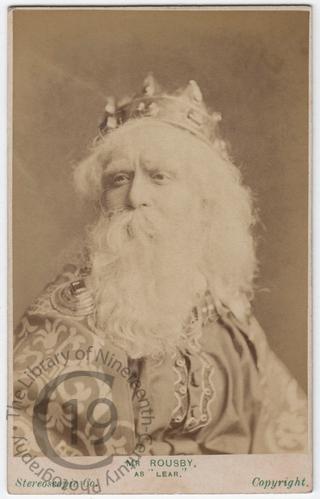
William Wybert Rousby
A carte-de-visite portrait of the English actor William Wybert Rousby (1835-1907), seen here dressed as King Lear in William Shakespeare’s tragedy.
‘Mr Rousby has evidently made a very careful study of this great part, for which he was several special aptitudes. It is full of that intensity of passion in the delineation of which Mr Rousby excels, and in which he as, we say it unhesitatingly, scarcely an equal on the British stage. That Mr Rousby gave all the wild tempests of rage, as they can be imagined it would be too much to say. That he did, however, succeed in giving a most expressive representation of Lear feeling the thanklessness of his children, of Lear in the storm, and of Lear in all madness and passion, cannot justly be denied. He was Lear. He placed the character before us as a living reality in most of its many vicissitudes. He had the audience with him from first to last, and the loud calls he received at the close of each act were thoroughly spontaneous and genuine. Mrs Rousby played the gentle Cordelia — a beautiful ideal creation — with much winning grace. There were a relief and a charm on each occasion when she entered on the stage; and the few but very fine sentences she has to deliver were spoken with admirable effect.’ (Weekly Freeman’s Journal, 5 November 1870, reprinting a review that previously appeared in the Northern Whig.)
Following the death of his wife in 1879 Rousby became the proprietor and manager of the Theatre Royal in Jersey. He finally retired from the stage in 1898 and died at St Peter’s Port in Guernsey on 10 September 1907.
‘Mr Wybert Rousby, the veteran tragedian, whose death has just taken place at Guernsey, was a native of Hull, and in his early days played with Phelps at Sadler’s Wells. For a number of years he and his wife, Mrs Clara Marion Rousby, played together in the provinces, and built themselves up a reputation of which due notice was taken in London. Eventually they appeared for the first time at the Queen’s Theatre, in Long-acre, in 1869, in Tom Taylor’s dram of “The Fool’s Revenge,” both scoring a success. After this Mr Rousby appeared at the Queen’s Theatre in several plays of note, in which his wife took the leading part.’ (Daily Mirror, 12 September 1907).
Photographed by the London Stereoscopic and Photographic Company.
Entered at Stationers’ Hall on 16 April 1873.
Code: 127833




